Contents
Stone cherries are a rather tricky gardening project that requires a lot of patience. Years will pass before the tree begins to bear fruit.
Is it possible to grow cherries from seed
Cherries need cross-pollination, so new trees don’t just grow from seed. Grafting and budding are the best ways to grow a tree, and a nursery is a good source to find a plant that is already on its way to fruiting. However, if you provide the planted bone with proper care, it will be possible to grow a tree from it. First you need to choose a cherry kernel that was grown in natural conditions, and not from a supermarket.
To select a cherry variety that is suitable for a particular region, you just need to find any growing cherry nearby. You can pick a berry from a tree at the dacha of friends or buy it on the market from people who grow fruits in this area.
Stone cherries can be grown both in the garden and at home. The main thing is to provide the plant with proper care.
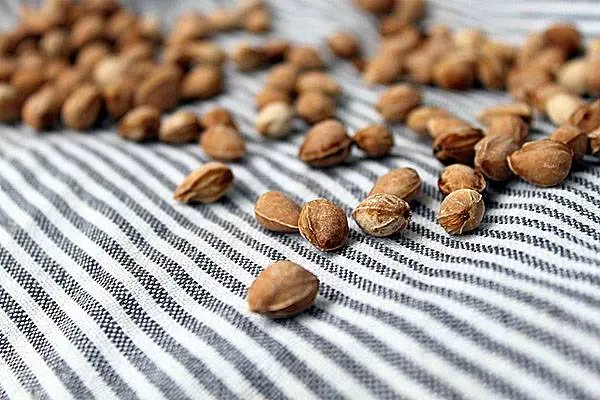
Benefits of growing cherries from the stone
Despite the many difficulties and nuances, there are advantages to growing cherries from seeds. This method of breeding the plant will make it more hardy and perhaps even more fruitful. Its advantages include:
- Increased winter hardiness of the tree.
- Good adaptation to local conditions.
- Reduced susceptibility to common stone fruit diseases.
Young trees grown from seeds will bear fruit, but they are much more profitable to use as rootstocks to create hybrids.
Will cherries grown from seed bear fruit?
Cherries grown from the kernel are more likely to start producing. However, it should be remembered that this method of breeding a plant is always a lottery. It can turn out both a tree with large and tasty fruits, and a wild game on which small sour berries grow.
A tree from a seed is definitely capable of bearing fruit. However, for successful pollination, at least two varieties must be grafted. Thanks to this, the plant will begin to bear fruit after about 5-6 years of life.
How to grow cherries from seed at home
Getting a cherry tree from a stone at home is a very real goal. With proper care, the seeds of the fruit will hatch and turn into small sprouts, which will eventually grow into large fruitful trees.
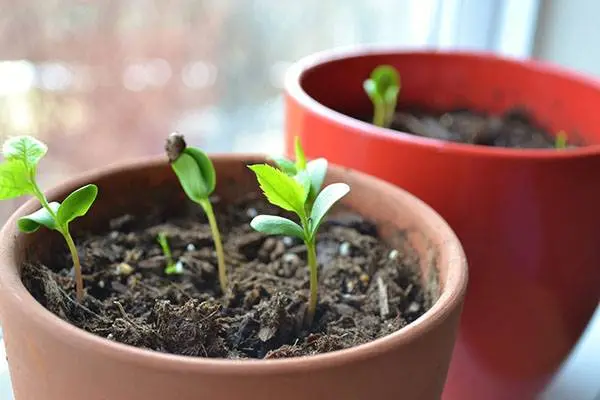
Selection and preparation of sweet cherries for planting
To grow cherries, the first step is to select the seeds from those berries that are already fully ripe. The fruit of a plant that grows in the area should be used. Imported sweet cherries are picked even before the stage of full ripening, so that it can be successfully transported.
In order to prepare fruit kernels for planting, you must perform the following steps:
- Pour and wash the bones with ordinary running water, clean them well from the remaining pulp. Since the probability of getting a sprout from the cherry kernel is about 70%, they need to be taken with a margin.
- Pour out the water and pat the bones dry with a paper towel. Lay them out in a room that is well ventilated.
- Put the dried fruit kernels in a paper bag and wrap with polyethylene. The protective film must be strong, if it is damaged, the bones will dry out, and the likelihood of sprouts will decrease.
- Store seeds at +20°C until winter sets in.
- In early December, the fruit kernels must be placed in water for 3-5 days. Fluid change every day.
Stratification of cherry stones
Soaked seeds must be mixed with absorbent material, put in a plastic container and placed in the refrigerator for 3 months.
In addition, an effective method of stratification is the freezing of cherries. In winter, the fruits are used in the cooking process, and their kernels, which are removed before heat treatment, can be washed and stored in the same way as described above.
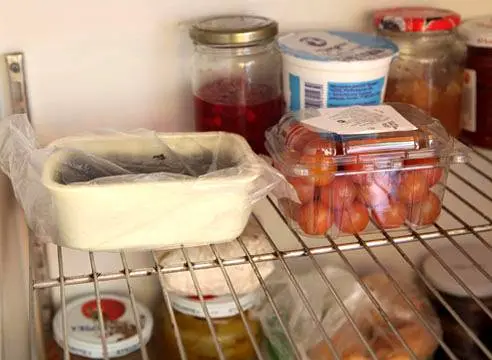
When and where to plant cherry pits
Planting cherry pits in most cases is carried out in the spring after stratification. Seeds must be placed in flower pots, the volume of which is about 500 ml. You can also use a small plastic container.
If the soil in which the mother plant was located was fertile enough, then it is best to take the soil from there, if not, buy a substrate.
Planting cherry seeds
To plant cherry seeds you need:
- Spread the drainage material evenly on the bottom of the dishes and pour the nutrient substrate onto it.
- Bury the fruit kernels inside the substrate by about 2 cm. If shared dishes are used, the seeds should be at least 15 cm apart.
- Pour the soil with water, cover the dishes with a polyethylene or glass cap and leave on the windowsill.
How to germinate a cherry pit
To quickly notice the sprout, you can mark the places where the seeds are buried with the help of pegs. The first shoots appear in about a month. If the seeds were already hatched, they will germinate a little earlier.
Future cherries do not require special care. All you need to do is water and loosen the soil regularly.
Cherry sprout care
Caring for sprouts also does not present any problems and difficulties. The main thing is to carry out the following activities in time:
- Regular soil moisture.
- Fertilize every two weeks.
- Spraying sprout sheets (while covering the soil with polyethylene).
- Soil loosening.
Transplantation of cherry seedlings in open ground
Mix 2 buckets of earth, 2 kg of ammonium sulfate, 3 kg of superphosphate, 1 liter of wood ash, 1 kg of potassium and 36 kg of humus and fill the holes with this by a third. If the soil is clayey, then two buckets of sand should be poured into the pits, if sandy – two buckets of clay. And only after that the soil mixture is added to them.
Before planting, you need to strengthen a special support for the seedling. In the middle of the pit, you need to make a small hill and place a seedling on it. Then it is attached to a support and topped up with soil. The root neck of a young tree should be located several centimeters above the soil surface.
After transplanting, it remains only to water the plant well and mulch the soil.
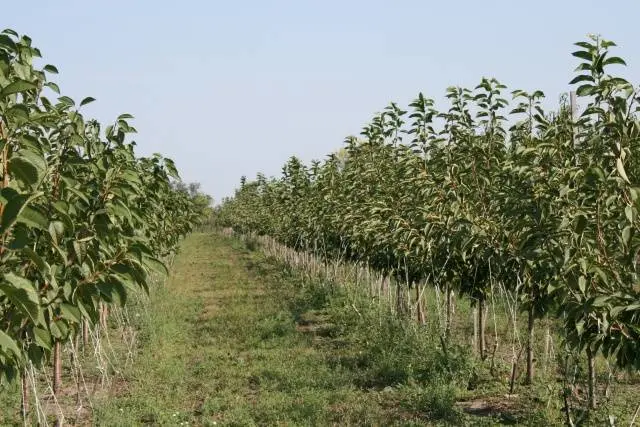
Rules for growing cherries from the stone
Since cherry seedlings are planted in autumn in most cases, the main danger for the tree is low temperatures and coming frosts. Therefore, it is necessary to prepare the plant for climate change:
- Wrap the tree trunk in burlap. However, you need to make sure that he doesn’t get carried away.
- Protect the tree from frost and winds by digging its lower part with snow.
- On top of the burlap is to wind the spruce branches.
- Decompose pesticides from rodents around the plant.
It is necessary to water the tree about once every 30 days through the hole. The first 3 years, sweet cherries can only be fertilized with nitrogen fertilizers.
To protect the plant from birds, unnecessary disks or cans can be tied to its branches.
How to grow cherries from a stone in the country or on the site
By choosing the right time to plant seeds and providing all the conditions for the successful growth and development of the plant, you can get a strong tree that brings a good harvest.
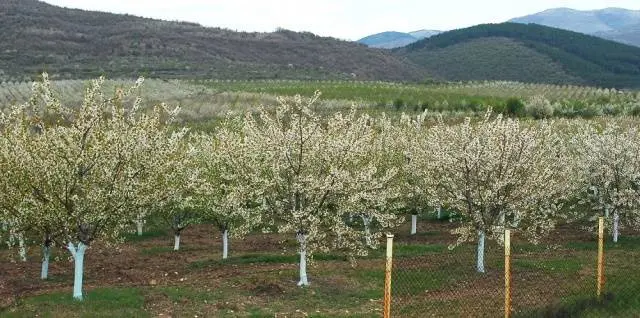
When and where can you plant cherries
You can plant bones in an unprotected area in summer or autumn. If you do this in the spring, the material for planting must be stratified, observing the required temperature and humidity.
Cherries are best planted on the south side of the site, where there is a lot of sunlight. Also, the plant needs protection from the winds.
How to grow cherries from the stone in the open field
Carefully washed bones should be planted in the ground. Too much frost in winter can kill sprouts. To save cherries, you can plant them in the spring after seed stratification.
The plant needs to be regularly watered and fed. You should also moisten its foliage every day.
The soil needs constant loosening.
Do I need to graft cherries grown from seed
The only way to turn a sweet cherry grown from a stone into a fruit-bearing tree is by grafting.
Timing of vaccination
Vaccination should be carried out three years after planting. The most suitable for this procedure is the spring period, when the probability of merging plants is quite high.
You can also graft a tree in the summer in cloudy dry weather or in the fall before the onset of severe cold.
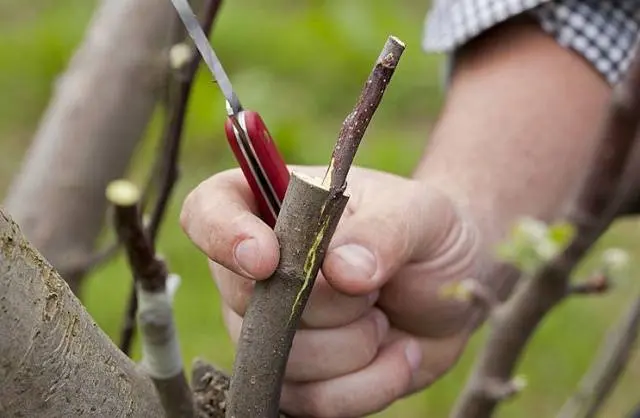
What can be grafted onto a cherry stock
Any variety can be grafted onto a cherry stock. The main thing is that it fits the given region. It is advisable to choose a variety that would be resistant to diseases, pests and temperature changes.
In addition, cherry stock can be grafted with cherries, cherry plums and plums. However, in the case of plums, this will be quite difficult, since these trees do not grow together as well as in the case of cherry plums and cherries.
Cherry Grafting Methods
There are several ways to vaccinate:
- Copulation.
- Improved copying.
- On bark.
- Into the cleft.
- In a semi-split.
- In a corner cut.
- In the side cutout.
- Bridge.
Conclusion
Pitted cherries are a laborious and lengthy process. However, if you work hard and give the plant the necessary care, the results are sure to be impressive. The main thing is to follow all the rules and take into account the characteristics of the plant and the conditions in which it develops.









